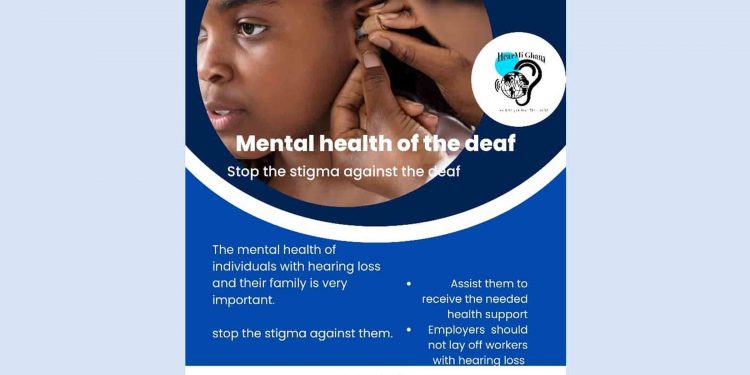To mark this year’s mental health day, HearMi Ghana an NGO that aims at reducing the incidence of hearing loss in Ghana, focuses on the mental health of people with hearing loss as the incidence of stigma associated with hearing loss is on the rise. The theme for this year’s celebration is “Make Mental Health and Wellbeing for All a Global Priority”.
According to WHO, Health is a state of complete physical, mental and social well-being and not merely the absence of disease or infirmity. An individual is not fully healthy when his psychological being is compromised.
In our part of the world (west Africa, Ghana), people look mean upon and disregard others living with hearing loss or are deaf.
The stigma and negative connation relative to hearing loss makes it difficult for people to accept their condition and seek medical intervention. They feel ashamed and weak. When this happen, it leads to social disengagement, low self-esteem and variety of serious health issues including depression and suicidal tendencies or ideations.
People with hearing loss are subjected to loads of prejudice and misconceptions. They are told they are old, less intelligent, they only hear what they want to hear etc.
In some communities, they refer to people with hearing loss as “mumu” which literally means a dumb person who lack intellectual capacity. We want to state emphatically that this popular notion is false. The fact that they cannot hear (well) does not mean their sense of reasoning is compromised.
In some families where there is a hearing impaired child among normal hearing kids, the deaf child is denied certain privileges including being left behind during important programmes and is likely to be locked up and asked not to show up when visitors are present because of the perceived embarrassment they will feel.
Parents of deaf children go through a lot of psychological trauma as a result of people mocking and stigmatizing against them for having child or children who could not hear. some ignorantly blame parents or elderly relation for being the cause of their children’s hearing impairment.
Hearing aid advertisers are also part of the reasons the stigma is not declining. They highlight the small size and discreet positioning of hearing aids which creates the impression that hearing aid is shameful and needs to be hidden.
There is a high incidence of employers rejecting applications from people with hearing loss while they prefer people with normal hearing. In some instances, people who already work in firms are laid off when they develop hearing loss even if the condition was occupationally induced without compensation which is very unfair.
THE WAY FORWARD.
- Families and society in general should accept and show love towards people with hearing impairment and assist them to seek medical interventions.
- We encourage social support for instance spousal support and not divorce in cases of a partner developing hearing loss.
- We should also know that hearing aids are not derogatory devices but one that helps hard to hear people hear better.
- Employers should assist their employees seek medical interventions when their staff develop hearing loss and duly compensate them when they have to disengage them especially when the condition is occupationally induced.
- It should be on record that hearing loss can be from birth or acquired after birth. Whichever way, it is either congenital or pathological which implies that it is not a spiritual condition but one that can only be resolved by medical intervention.
Sign
Mr. William Hodzi.
Founder; HearMi Ghana





























